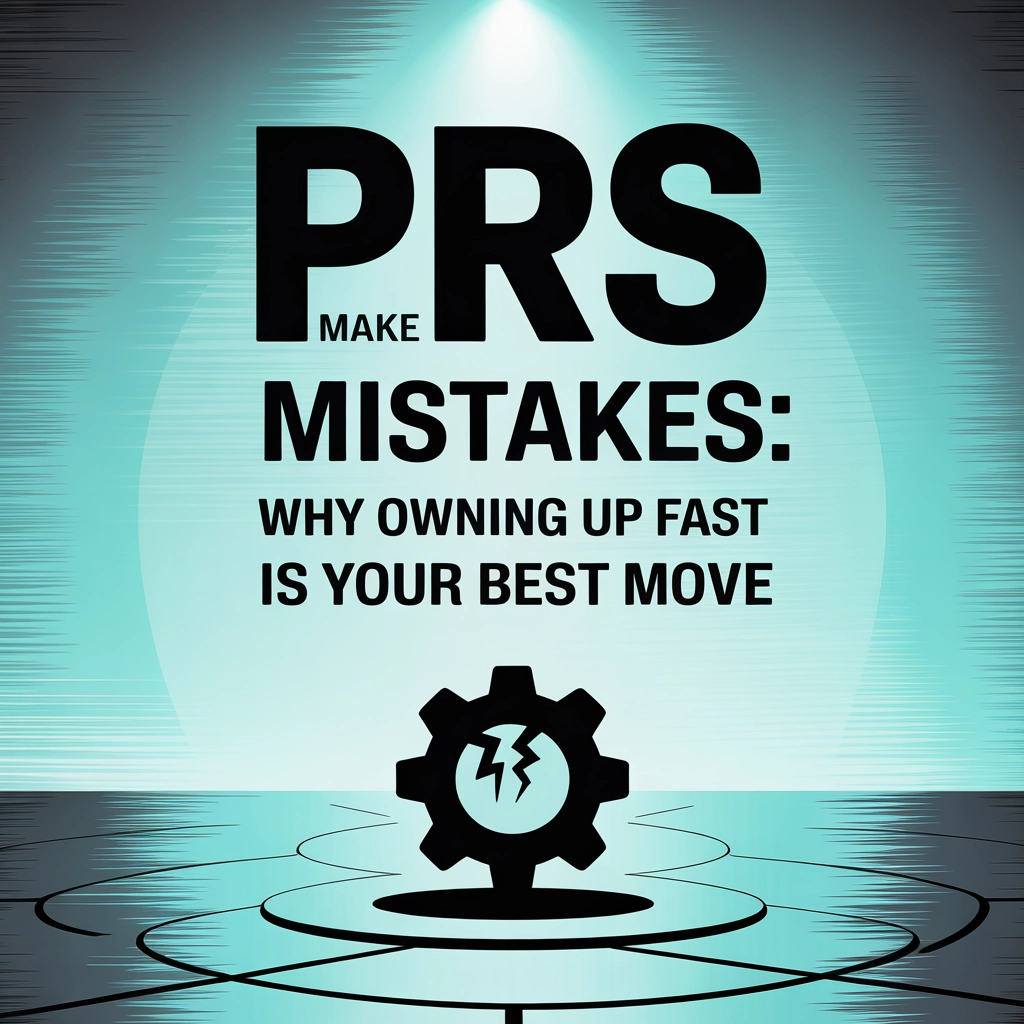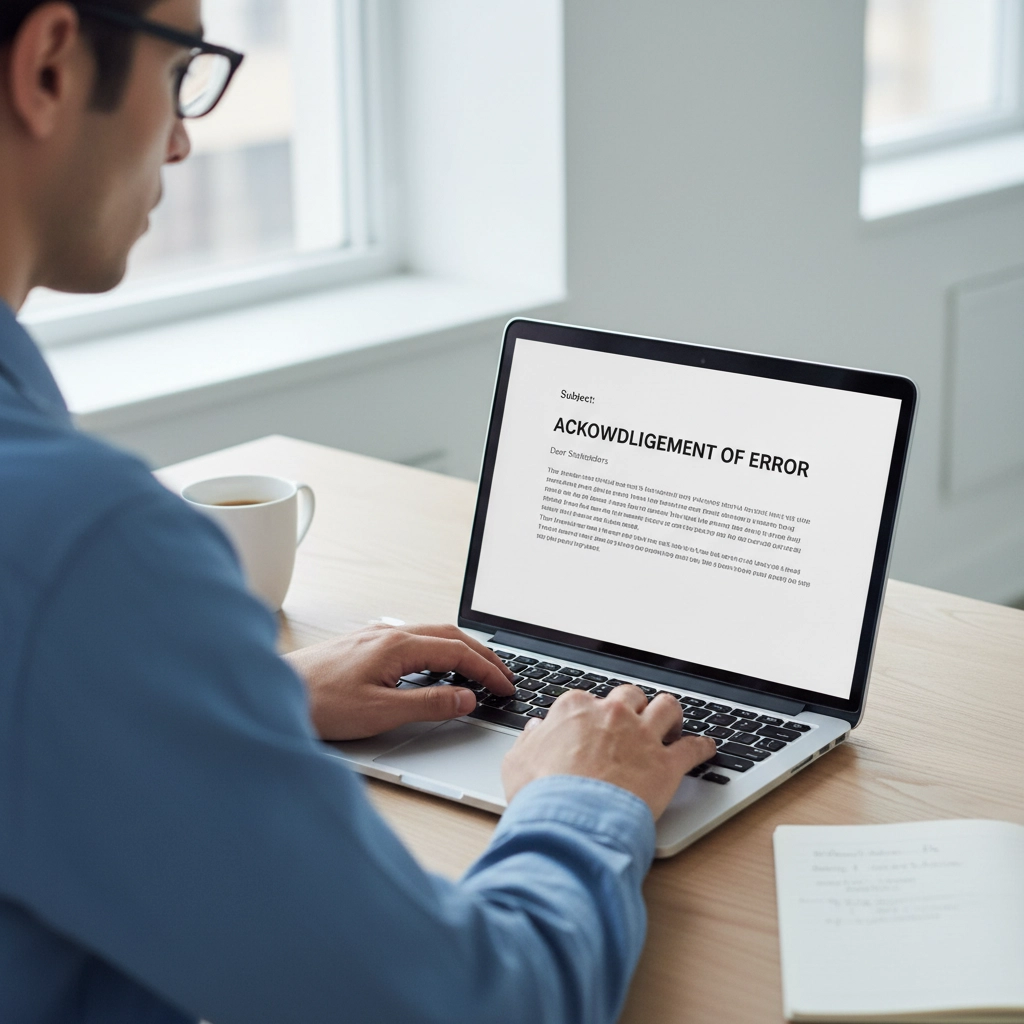
Let's be honest—we've all been there. That sinking feeling when you realise you've made a mistake, sent the wrong information to a journalist, or completely misunderstood a client's brief. The natural instinct? Panic, then hope nobody notices. But here's the thing: in the world of public relations, trying to cover up or ignore mistakes almost always makes things infinitely worse.
The golden rule of crisis management applies just as much to PR professionals as it does to the clients we advise: own your mistakes quickly, completely, and honestly. It's not just good ethics—it's smart business.
Why Denial Makes Everything Worse
When PR professionals make mistakes and then try to deny, deflect, or delay acknowledgment, they typically create far bigger problems than the original error. This defensive approach has a nasty habit of turning minor slip-ups into major reputation disasters.
Think about it from your client's perspective. They've hired you to manage their reputation and communications. If they discover you've made an error—perhaps sent incorrect information to the media or missed a crucial deadline—their initial frustration might be manageable. But if they then discover you've been trying to hide it or blame someone else? That's when trust evaporates completely.

The same principle applies to your relationships with journalists, stakeholders, and industry all media professionals. Trying to cover up, misdirect or worse deny you have made a mistake will simply damage your reputation. Once you've lost credibility with a journalist by trying to cover up a mistake, rebuilding that relationship becomes exponentially more difficult.
Those affected by PR mistakes often experience genuine anger when organisations fail to acknowledge errors immediately, especially when the mistake is obvious to everyone involved. This defensive posture creates additional problems beyond the original mistake, as people become frustrated not just with the initial error but with the PR professional's unwillingness to take responsibility.
The Strategic Power of Quick Acknowledgment
Swift acknowledgment isn't just damage control—it's a strategic move that can actually strengthen relationships in the long run. When you immediately own up to mistakes, or as soon as you realise the error you demonstrate several valuable qualities that clients and media contacts prize highly: accountability, professionalism, and the confidence that comes with genuine competence.
Here's what immediate acknowledgment accomplishes:
Stops the speculation: When you're transparent about what went wrong, you control the narrative rather than letting others fill in the gaps with potentially worse assumptions.
Frees up resources: Instead of spending time and energy maintaining an increasingly difficult defensive position, you can focus on actually fixing the problem and preventing future issues.
Demonstrates reliability: Ironically, admitting mistakes quickly often makes people trust you more, not less. It shows you're someone who takes responsibility and won't leave them guessing about problems.
Preserves relationships: Media contacts and clients appreciate honesty. They understand that everyone makes mistakes, but they can't tolerate being misled or kept in the dark.
How to Acknowledge Mistakes Properly
Not all apologies are created equal. Generic, blanket apology statements fail to resonate, because they suggest a lack of genuine effort or consideration and lets be honest we have all heard meaningless apologies and don't believe them. Effective acknowledgments need to be both sincere and specific.

Here's the framework that works:
Be direct and clear: Don't bury the acknowledgment in corporate speak. Say exactly what went wrong without minimising or making excuses.
Take full ownership: Use "I" or "we" statements. Avoid passive voice like "mistakes were made" or deflecting blame to others.
Address the impact: Acknowledge specifically how your mistake affected others. Show that you understand the consequences of your error.
Explain your learning: If appropriate outline what you've learned from the situation, how it will inform your future work**** and what steps you're taking to prevent similar mistakes happening again. For example: Last week we were provided with information from a journalist about a report coming out that impacted the work of a client. Sending over some extracts and asking for comments, we issued a press release, BUT, the journalist had mixed up the name, giving us a similarly named organisation. A mistake that was repeated in the subsequent press release. As soon as we were made aware of the error, we issued a correction and apology, with a new release being agreed with the client and put out within minutes. We could have tried to ignore the mistake, perhaps even bury the fact at the end of a long boring press release put out after most journalists had finished for the day, but that is not how we work at Team Britannia PR. We made a genuine and very rare mistake.
Why Timing Is Everything
In crisis communications, the window for meaningful response closes rapidly. The longer you wait to acknowledge a mistake, the less meaningful your response becomes. This is particularly true in our digital age, where news and reactions spread in minutes rather than hours or days.
The fundamental principle is simple: own your errors, as we did before others own the conversation about them. Once speculation starts or, worse, once someone else points out your mistake publicly, your acknowledgment becomes reactive rather than proactive—and reactive responses always carry less weight.
However, speed must be balanced with accuracy. While immediate response is crucial, you need enough facts about the situation to provide an honest and substantive acknowledgment. This doesn't mean waiting for perfect information, but rather gathering sufficient details to avoid making another mistake in your correction.

Building Trust Through Transparency
The most successful PR professionals understand that transparency, even when it's uncomfortable, builds stronger long-term relationships than any amount of spin or deflection. Stakeholders—whether they're clients, journalists, or industry peers—can typically sense insincerity, and any lack of genuineness will amplify damage rather than help repair it.
This means being completely honest about what happened, why it happened, and what you're doing about it. Don't try to minimise the mistake or shift blame elsewhere. Don't make excuses about being overworked or having too many clients. Simply acknowledge what went wrong and focus on your response.
Professional relationships in PR are built on trust, and trust is built through consistent reliability and honesty. When you handle mistakes well, people remember. They remember that you were straight with them, that you took responsibility, and that you learned from the experience.
Practical Steps for PR Professionals
When you realise you've made a mistake, here's your action plan:
Stop and assess immediately: Don't send another email or make another call until you understand exactly what went wrong and who's affected.
Contact affected parties quickly: Reach out to clients, journalists, or other stakeholders who need to know about the error as soon as possible.
Prepare a clear explanation: Have the facts straight before you communicate, but don't delay communication to perfect your explanation.
Follow up appropriately: Check that your correction has been received and understood, and that any necessary actions have been taken.
Document and learn: Make notes about what led to the mistake and what processes could prevent similar issues in future.
The Legal Balance
While transparency is paramount, PR professionals must consider the legal implications of their acknowledgments, particularly when working with clients in regulated industries or sensitive situations. Word choice becomes important when professional licenses or legal liability could be at stake.
The goal is to be truthful and accountable while avoiding language that could create additional legal complications. This often requires collaboration between PR teams and legal counsel to craft responses that satisfy both transparency requirements and legal prudence.

Why It's Worth It
Admitting mistakes quickly isn't just about minimising damage—it's about building a reputation as someone who can be trusted with important work. In an industry where relationships are everything, being known as someone who takes responsibility and deals with problems head-on is invaluable.
Clients will trust you more, not less, when they see how you handle errors. Journalists will continue to work with you because they know you won't mislead them. Industry peers will respect your professionalism and integrity.
Most importantly, you'll sleep better at night knowing that you've handled your mistakes with honour and professionalism. In the high-pressure world of public relations, that peace of mind is worth its weight in gold.
The next time you make a mistake—and there will be a next time, because we're all human—remember that how you respond will define your professional reputation far more than the mistake itself ever could.
